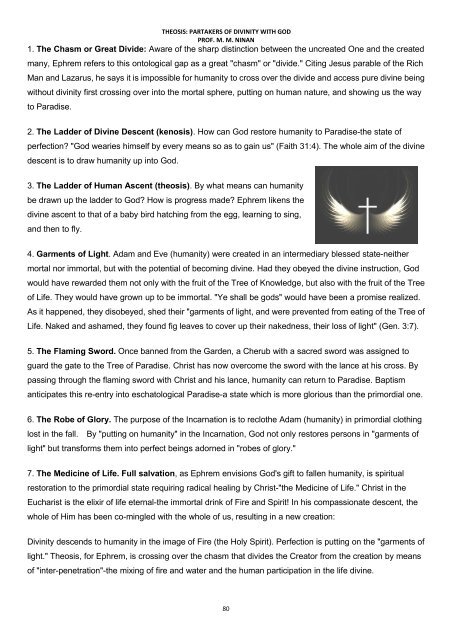Theosis
You also want an ePaper? Increase the reach of your titles
YUMPU automatically turns print PDFs into web optimized ePapers that Google loves.
THEOSIS: PARTAKERS OF DIVINITY WITH GOD<br />
PROF. M. M. NINAN<br />
1. The Chasm or Great Divide: Aware of the sharp distinction between the uncreated One and the created<br />
many, Ephrem refers to this ontological gap as a great "chasm" or "divide." Citing Jesus parable of the Rich<br />
Man and Lazarus, he says it is impossible for humanity to cross over the divide and access pure divine being<br />
without divinity first crossing over into the mortal sphere, putting on human nature, and showing us the way<br />
to Paradise.<br />
2. The Ladder of Divine Descent (kenosis). How can God restore humanity to Paradise-the state of<br />
perfection? "God wearies himself by every means so as to gain us" (Faith 31:4). The whole aim of the divine<br />
descent is to draw humanity up into God.<br />
3. The Ladder of Human Ascent (theosis). By what means can humanity<br />
be drawn up the ladder to God? How is progress made? Ephrem likens the<br />
divine ascent to that of a baby bird hatching from the egg, learning to sing,<br />
and then to fly.<br />
4. Garments of Light. Adam and Eve (humanity) were created in an intermediary blessed state-neither<br />
mortal nor immortal, but with the potential of becoming divine. Had they obeyed the divine instruction, God<br />
would have rewarded them not only with the fruit of the Tree of Knowledge, but also with the fruit of the Tree<br />
of Life. They would have grown up to be immortal. "Ye shall be gods" would have been a promise realized.<br />
As it happened, they disobeyed, shed their "garments of light, and were prevented from eating of the Tree of<br />
Life. Naked and ashamed, they found fig leaves to cover up their nakedness, their loss of light" (Gen. 3:7).<br />
5. The Flaming Sword. Once banned from the Garden, a Cherub with a sacred sword was assigned to<br />
guard the gate to the Tree of Paradise. Christ has now overcome the sword with the lance at his cross. By<br />
passing through the flaming sword with Christ and his lance, humanity can return to Paradise. Baptism<br />
anticipates this re-entry into eschatological Paradise-a state which is more glorious than the primordial one.<br />
6. The Robe of Glory. The purpose of the Incarnation is to reclothe Adam (humanity) in primordial clothing<br />
lost in the fall. By "putting on humanity" in the Incarnation, God not only restores persons in "garments of<br />
light" but transforms them into perfect beings adorned in "robes of glory."<br />
7. The Medicine of Life. Full salvation, as Ephrem envisions God's gift to fallen humanity, is spiritual<br />
restoration to the primordial state requiring radical healing by Christ-"the Medicine of Life." Christ in the<br />
Eucharist is the elixir of life eternal-the immortal drink of Fire and Spirit! In his compassionate descent, the<br />
whole of Him has been co-mingled with the whole of us, resulting in a new creation:<br />
Divinity descends to humanity in the image of Fire (the Holy Spirit). Perfection is putting on the "garments of<br />
light." <strong>Theosis</strong>, for Ephrem, is crossing over the chasm that divides the Creator from the creation by means<br />
of "inter-penetration"-the mixing of fire and water and the human participation in the life divine.<br />
80

















